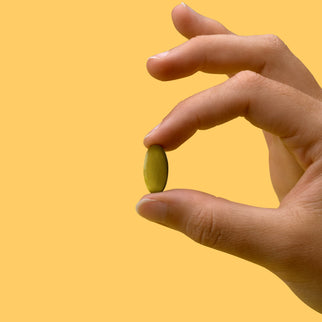Paying attention to our bodies is an essential part of maintaining overall wellness, and our joints are no exception. As the literal connections keeping our bodies in motion, our joints are crucial to our ability to move, work, play, and even relax.
When our joints start to hurt, it can feel like our bodies are betraying us, hindering our ability to enjoy life to the fullest. Joint pain is an all-too-common issue, but understanding why it happens is the first step to finding relief.
Today, we’re going to talk about some of the most common reasons why your joints might be hurting. We’ll also discuss a few of the ways that you can support your joint health to minimize the pain and discomfort that you feel.
12 Reasons Why Your Joints Might Be Hurting
Aching joints can range from being a nuisance to seriously limiting our ability to function. Understanding the root cause of your joint pain can help you to determine the best action for relief.
Here are 12 of the most common reasons why your joints might be hurting:
1. Aging
As we age, our bodies naturally go through changes, and our joints are no exception. Over time, the cartilage that acts as a cushion between our joints begins to thin and wear down. This can lead to a condition known as osteoarthritis, a common form of arthritis that’s closely linked to aging. Osteoarthritis can cause symptoms such as joint pain, stiffness, and reduced mobility, significantly impacting an individual's quality of life.
2. Bursitis
Bursae are small, fluid-filled sacs that act as cushions between our bones and ligaments, helping to reduce friction in our joints. However, these sacs can become inflamed due to overuse or injury, leading to a health condition known as bursitis. Bursitis often affects the shoulder, elbow, and hip joints, causing pain and limiting movement. It's essential to rest and protect the affected area to allow the inflammation to subside.
3. Diet
Our diet plays a significant role in our overall health, including the health of our joints. Consuming foods high in sugar and unhealthy fats can trigger inflammation throughout the body, including our joints, leading to pain and discomfort. On the flip side, diets lacking essential nutrients can leave our joints undernourished and susceptible to wear and tear. A balanced, nutrient-rich diet can support joint health and help prevent inflammation.
4. Genetics
Genetics play a role in many aspects of our health, including our joints. If your family has a history of joint issues, you may be genetically predisposed to genetic health conditions that can cause joint pain. Being aware of your family history can help you take proactive steps to protect your joint health.
5. Gout
Gout is a specific type of arthritis caused by a buildup of uric acid crystals in the joints. These crystals can cause sudden, intense flare-ups of pain, often in the big toe. Gout attacks can be incredibly painful and are often accompanied by redness and swelling in the affected joint. Managing uric acid levels through diet and medication can help prevent gout attacks.
6. Illness and Infections
Certain illnesses and infections can lead to septic arthritis and joint pain. For example, Lyme disease, caused by a tick bite, or viral infections like the flu, can cause inflammation in the joints leading to discomfort. While in some cases, this joint pain may be a temporary side effect, in others, septic arthritis can persist long after the initial illness has resolved, becoming a chronic issue that requires ongoing management.
7. Injury or Overuse
Injuries, whether they're sudden like an ankle sprain from a misstep or repetitive motion-induced back pain, can cause joint discomfort. The overuse of a joint, often seen in athletes or physically demanding jobs, can lead to inflammation and lingering joint pain. It's crucial to give your body ample time to heal following an injury and to practice moderation in physically strenuous activities to prevent overuse.
8. Physical Activity
Striking the right balance in physical activity is key to joint health. Overexertion or too much high-impact exercise injuries and inflammation, causing joint pain. On the other hand, a sedentary lifestyle can weaken the musculoskeletal system that supports our joints, leading to joint stiffness and discomfort. Incorporating regular, low-impact exercise into your routine can help strengthen your joints and improve flexibility.
9. Rheumatoid Arthritis
Rheumatoid arthritis is an autoimmune disease where the body's immune system turns on itself, mistakenly attacking its own tissues, including joints. This misdirected immune response results in inflammation, causing swelling and pain in and around the joints. It's a chronic condition that requires medical intervention and lifestyle modifications for management.
10. Stress and Mental Health
The mind-body connection plays a significant role in managing joint pain. Stress, anxiety, and depression can amplify physical discomfort, including joint pain. Conversely, chronic joint pain can lead to mental health issues, creating a vicious cycle. Therefore, managing stress and prioritizing mental health is crucial in dealing with joint pain.
11. Tendinitis
Tendinitis occurs when a tendon, the fibrous tissue connecting muscle to bone, becomes inflamed or irritated. This can be due to repetitive minor impacts or a sudden serious injury, causing pain and tenderness near the affected joint. It's most common in elbows, knees, shoulders, hips, and heels and requires rest and appropriate treatment for recovery.
12. Weight
Your weight plays a significant role in joint health. Carrying extra pounds puts additional stress on weight-bearing joints, especially the knees and hips, leading to joint pain and increasing the risk of conditions like osteoarthritis. Undergoing weight loss and maintaining a healthy weight can alleviate joint pain by reducing this extra strain and promoting overall joint health.
How Can You Manage Joint Discomfort?
Navigating the world of joint pain treatments can feel daunting. With so many options available, how do you know which is the best path to relief? The truth is, the "best" treatment can vary widely depending on the cause and severity of your joint pain. We're here to help guide you through some of the most common and effective medical treatment options for joint pain.
When joint pain strikes, many of us reach for over-the-counter nonsteroidal anti-inflammatory drugs (NSAIDs) like ibuprofen and naproxen. NSAIDs block the production of certain body chemicals that cause inflammation, effectively reducing swelling, pain, and fever. For those experiencing more severe pain, a healthcare provider may prescribe stronger pain relievers. In some cases, corticosteroid injections, which can help reduce inflammation and relieve joint pain, may be the most effective option.
Another option for joint pain relief is the use of heating pads and ice packs. A heating pad applies heat to the area of discomfort, helping to relax muscles and increase blood flow. This increased circulation can aid in the healing process and provide temporary relief from joint pain. On the other hand, cold packs can help to reduce inflammation by numbing the affected area and providing immediate, short-term relief. The cold temperature slows down blood flow to the area, which can reduce swelling and dull pain sensations.
For some, physical therapy can be an effective treatment for joint pain. Physical therapists are experts in movement and function. They can work with you to strengthen the muscles around your joints, improve your range of motion to prevent joint stiffness and develop strategies to manage your pain. This might involve a combination of low-impact exercises, stretches, and other therapeutic techniques. By engaging in physical therapy, you’ll be working to build strength and flexibility to prevent future issues.
In severe cases of joint pain, when the joint is extensively damaged, and non-surgical treatments are no longer providing relief, joint replacement surgery might be recommended. This is a major surgical procedure that involves removing the damaged joint and replacing it with an artificial one. Joint replacement surgery is typically considered a last resort, reserved for when other treatments have failed to alleviate pain or when the joint damage is significantly impacting your quality of life.
Ultimately, persistent joint pain and stiffness should never be ignored. If you're experiencing these symptoms, it's important to seek help from a medical professional. Your healthcare provider may perform a physical exam, ask about your symptoms, and potentially order X-rays or blood tests to help determine the root cause of your pain. They can also guide you toward the most effective treatment options for your specific situation and monitor your progress.
How Can Omega-3 Supplements Support Overall Joint Health?
Nutrition plays a crucial role in joint health, with one nutrient in particular that stands out: omega-3 fatty acids. These essential fats are held in high regard for their soothing properties, which make them a powerful weapon in the war against uncomfortable joints.
Enter iwi life's plant-based omega-3 supplements.
Harnessing the power of nature, we've created a range of supplements that aren’t only good for you but also good for our planet. Our supplements are derived from algae, a sustainable and highly effective source of omega-3. We use our own strain of algae, Nannochloropsis, farmed sustainably in desert ponds, to create our signature omega-3 products.
Why algae, you might ask? Well, algae-derived omega-3 fats have a distinct advantage over other plant-based sources. They provide pre-formed DHA and EPA, the most beneficial forms of omega-3, which are directly used by our bodies. This contrasts with omega-3 from sources like flaxseed or chia, which provide ALA, a form that needs to be converted into EPA and DHA in our bodies — a process that's not very efficient.
The Bottom Line
Understanding our bodies is a journey, and if you've read this far, you've already taken significant strides down the path to better joint health. From the natural wear and tear that comes with aging to the influence of our weight, diet, and even our genes, there are numerous factors that can cause our joints to hurt. Knowledge is power, and understanding these causes is the first step towards finding relief.
Health and wellness aren't just about reacting to problems but also about proactively nurturing our bodies. If your joints have been causing you discomfort, it's essential to take action. Don't hesitate to seek advice from healthcare providers if you're experiencing persistent joint issues. They can help guide you toward effective treatments and strategies to manage your joint health.
Here at iwi life, we believe in the power of nature to nourish and support joint health, and we've harnessed this power in our plant-based omega-3 joint supplement. Let iwi life be your partner on this journey towards healthier joints and a happier, more vibrant life.
Sources:
What Causes Osteoarthritis, Symptoms & More | NIAMS
Excessive Intake of Sugar: An Accomplice of Inflammation | PMC
Septic Arthritis: What Is It, Symptoms, Treatment & Causes | Cleveland Clinic
Nonsteroidal Anti-Inflammatory Drugs (NSAIDs) | NCBI Bookshelf
Joint Replacement Surgery: Health Information Basics for You and Your Family | NIAMS
Overuse Syndrome: Symptoms, Treatment & Prevention | Cleveland Clinic


















